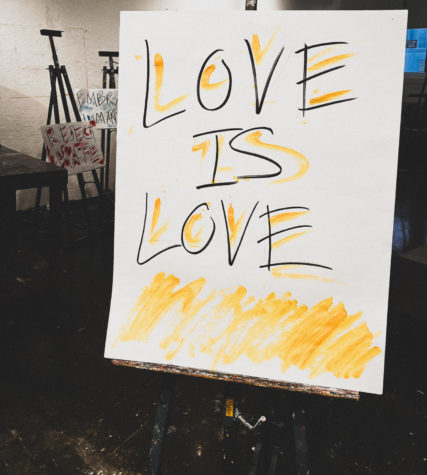counter protesting safely: what to do when combating hatred
Hate has no place on campus or anywhere in this world. People on all sides of an issue will protest, and the opposition will respond. Whether you join in support of a protest, in opposition or not at all, this is your choice. Everyone has the right to stand up for what they believe in, especially when standing up against hate.
On Sept. 8, some members of Kent State’s student body protested against two preachers who were standing on the K sharing anti-LGBTQ+ views.
KentWired reported that the student protest group waved “signs of positive affirmations and acceptance” against the preachers’ anti-LGBTQ+ messages. Two men spent approximately six hours in Risman Plaza promoting their anti-LGBTQ+ views while some Kent students voiced their disapproval of such views and counter protested.
One protester, sophomore exploratory major Andrea Bonamico, said of the experience, “The amount of people that would not tolerate his message, advocating for those who continuously get hate for who they are and who they love, made me very happy to witness.”
With this event in tow and reports of this same behavior happening on college campuses all over Ohio, here are some tips for combating bigotry and staying safe while doing so, as well as links to resources to help you take care of yourself.
Safety
Safety is a key element when protesting. This can be a dangerous and occasionally scary thing to do, so please keep in mind the following tips:
- Always assess the situation first, and ensure the other person is nonviolent. Trust your gut on this, humans are very good at intuitively knowing signs of aggression.
- Don’t be afraid to not engage. If you have any hesitancy before even going in, pull away.
- Stay in a group! People are more likely to cause danger or harm if they spot a victim alone in any kind of situation, especially in situations like these.
- Watch out for intense emotion from the other person. Emotional people can become violent, and it’s smart to remain vigilant and remove yourself before anyone gets physical.
The Argument
Remain emotionally passive. If your opponent sees weakness, they will attack you rather than the argument and see that as a win.
Stay salient. Keep it to one topic at a time, and try to prove one point before going on to the next one, as it’s more effective in an argument.
Keep the moral high ground. Shouting, name-calling and insults may feel good momentarily, but it will only add to their hatred. Additionally, passersby are unlikely to side with anyone who seems nasty or crude, but will find sympathy for those who remain peaceful and polite. As Michelle Obama says, “When they go low, we go high.”
If you debate, make sure you’re knowledgeable on the subject. Include facts in your argument, not just anecdotal evidence. One way to make the opponent think is to ask a question. Try to get to the why for a more effective counterargument, and to really make them reflect.
Don’t laugh. Your words will not create change if there is not a pretense of mutual respect, or at least a semblance of one. Laughing at your opponent in a mocking way will make them angrier and potentially more dangerous. Additionally, if they let off offensive insults disguised as jokes, don’t let them think it’s funny. Interrupting their “joke” before the punchline is also an effective tactic here.
Share a positive message, like a story of a loved one. If you tell an opponent that you have a family member who is in the LGBTQ+ community for example, an opponent’s argument may shift from “all” to “some.” Also, don’t attack your opponent’s character, just their argument. They will be unwilling to listen to you and will see you as irrational if they don’t believe you see them with some sort of mutual respect, at least with you both acknowledging your humanity and right to opinions.
If the argument is going nowhere, just leave. You do not owe anyone your time going in circles, especially when an argument turns into slinging insults. By walking away, you can also end the argument on your terms.
Most importantly, don’t be afraid to remove yourself from the situation. You are not obligated to argue with anyone if you do not want to or do not feel safe or comfortable doing so. Take care of yourself first. Be able to document information if the worst happens or have a friend with a camera. If something serious happens, like if you or someone else is a victim of assault, having documentation of this will be a solid basis for legal action, if it should need to happen.
Be sure to consider the feelings of those being targeted around you. Allyship is not defined as just defending a group, but supporting them in a time of crisis as well. If someone feels attacked and unaccepted due to hateful speech or actions, an argument is not the most important thing to get involved with. Words of kindness could drown out the words of hate, and remind victims of hate speech that they do have a place in the world where they are accepted. People come first.

Some resources to check out:
- Division of Diversity, Equality and Inclusion resource list
- LGBTQ+ Center
- BIPOC Safespace
- Student Support Services
- Community, Anti-Racism and Equity Committee
Support Student Media
Hi! I’m Catie Pusateri, A Magazine’s editor-in-chief. My staff and I are committed to bringing you the most important and entertaining news from the realms of fashion, beauty and culture. We are full-time students and hard-working journalists. While we get support from the student media fee and earned revenue such as advertising, both of those continue to decline. Your generous gift of any amount will help enhance our student experience as we grow into working professionals. Please go here to donate to A Magazine.











